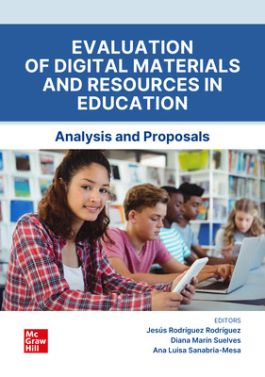Evaluation of digital materials and resources in Education
1.ª Edición
8448647459
·
9788448647452
© 2025 | Publicado: 31 de Julio de 2025
This book was created as part of the research project Digital Learning Materials inCompulsory Secondary Education. Analysis and Proposals for School and Socio-FamilyUse (Secundari@ Digit@l) (PID2022-137366OB-100).Researchers from Spain (Galicia, The …
Leer más
Solicitar más información
Libro de impresion bajo demanda. Para su adquisición por favor haga click aqui
1: Evaluation of educational resources
2: Evaluation Models and Guidelines for the analysis of materials in the digital society
3: Textbook evaluation policies in Brazil, Spain and Portugal
4: The relevance of Critical Discourse Studies in the evaluation of teaching materials
5: Generative artificial intelligence and the digital transformation of teaching materials
6: Navigating the digital ecosystem: analysis of institutional education platforms
7: Analysis of the supply of digital educational resources from institutional platforms
8: Analysis of resources for Secondary Education. The case studies of INTEF, Rebost Digital and Eco-Escuela 2.0
9: Analysis of the institutional offer of interactive digital teaching materials. Brújula20 and Aula Digital Canaria
10: Publishers’ digital educational platforms and resources: an analysis for Secondary Education
11: Analysis of commercial digital learning platforms and digital educational media based on research results
12: Evaluating the quality of educational apps
13: Assessment of tools for the creation of didactic materials: Canva, Genially and Prezi
14: Evaluating GeoGebra as a digital STEAM tool: use and impact in Secondary Education
15: From Super Mario to Minecraft: assessing the development of key competences in Compulsory Secondary Education through video games
16: Digital textbooks under scrutiny
17: Analysis of drama in teaching materials in Basic Education: Where are we heading?
18: The climate crisis in Spanish textbooks: nine proposals for a new era
19: Evaluation of digital educational resources in institutional portals for students with ASD: analysis of its content and pedagogical characteristics
20: The evaluation of digital materials and resources in History
21: Official orientations and evaluation guidelines on Digital Educational Materials for 6th to 9th grades Art subject under the PNLD national Brazilian textbook policy
22: Evaluation of audio-visual curricular materials on the Alexander Technique
23: Evaluating various types of digital learning resources
24: The selection of digital materials and resources in Secondary Education: an educational guidance proposal
25: Good practices for ensuring universal accessibility of educational resources in Secondary Education
26: Analysis of gender equality in digital educational resources for ESO (Secondary Education)
27: Initiatives and proposals of the CAVILA didactic materials group: after 25 years of reflective analysis
2: Evaluation Models and Guidelines for the analysis of materials in the digital society
3: Textbook evaluation policies in Brazil, Spain and Portugal
4: The relevance of Critical Discourse Studies in the evaluation of teaching materials
5: Generative artificial intelligence and the digital transformation of teaching materials
6: Navigating the digital ecosystem: analysis of institutional education platforms
7: Analysis of the supply of digital educational resources from institutional platforms
8: Analysis of resources for Secondary Education. The case studies of INTEF, Rebost Digital and Eco-Escuela 2.0
9: Analysis of the institutional offer of interactive digital teaching materials. Brújula20 and Aula Digital Canaria
10: Publishers’ digital educational platforms and resources: an analysis for Secondary Education
11: Analysis of commercial digital learning platforms and digital educational media based on research results
12: Evaluating the quality of educational apps
13: Assessment of tools for the creation of didactic materials: Canva, Genially and Prezi
14: Evaluating GeoGebra as a digital STEAM tool: use and impact in Secondary Education
15: From Super Mario to Minecraft: assessing the development of key competences in Compulsory Secondary Education through video games
16: Digital textbooks under scrutiny
17: Analysis of drama in teaching materials in Basic Education: Where are we heading?
18: The climate crisis in Spanish textbooks: nine proposals for a new era
19: Evaluation of digital educational resources in institutional portals for students with ASD: analysis of its content and pedagogical characteristics
20: The evaluation of digital materials and resources in History
21: Official orientations and evaluation guidelines on Digital Educational Materials for 6th to 9th grades Art subject under the PNLD national Brazilian textbook policy
22: Evaluation of audio-visual curricular materials on the Alexander Technique
23: Evaluating various types of digital learning resources
24: The selection of digital materials and resources in Secondary Education: an educational guidance proposal
25: Good practices for ensuring universal accessibility of educational resources in Secondary Education
26: Analysis of gender equality in digital educational resources for ESO (Secondary Education)
27: Initiatives and proposals of the CAVILA didactic materials group: after 25 years of reflective analysis
This book was created as part of the research project Digital Learning Materials in
Compulsory Secondary Education. Analysis and Proposals for School and Socio-Family
Use (Secundari@ Digit@l) (PID2022-137366OB-100).
Researchers from Spain (Galicia, The Canary Islands and Valencia), with more than 10 years of experience in the study of digitization processes at different levels of education,
participated in the research. The purpose of the project is to analyze the current state
of production, distribution and pedagogical use of both educational digital content and
online teaching materials aimed at Secondary Education (12-16 years).
Compulsory Secondary Education. Analysis and Proposals for School and Socio-Family
Use (Secundari@ Digit@l) (PID2022-137366OB-100).
Researchers from Spain (Galicia, The Canary Islands and Valencia), with more than 10 years of experience in the study of digitization processes at different levels of education,
participated in the research. The purpose of the project is to analyze the current state
of production, distribution and pedagogical use of both educational digital content and
online teaching materials aimed at Secondary Education (12-16 years).

